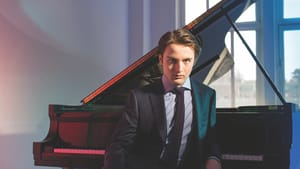Stay in the Loop
BSR publishes on a weekly schedule, with an email newsletter every Wednesday and Thursday morning. There’s no paywall, and subscribing is always free.
Whose music is this, anyway?
PCMS presents pianist Daniil Trifonov

Young Russian pianist Daniil Trifonov is a hot ticket. Few musicians have been as noticed on the international recital circuit as he has since his 2011 debut, and last week he performed to a sold-out Philadelphia Chamber Music Society audience.
It doesn’t take more than a few bars of listening to understand why. Trifonov’s technique takes you back to Horowitz, maybe even Liszt. It also helps that, unlike other young tyros, he doesn’t use distracting mannerisms; he approaches the piano, sits down, and gets to work. In the program’s first half, only a single, stiff bow accompanied the end of each piece.
His own ideas
It was also evident from the start Trifonov has his own ideas about the music he plays. His approach, though it seems a bit odd, signals a serious and original musical intellect exploring fresh approaches to familiar repertory. Given Trifonov’s combination of formidable technique and exquisite sensitivity, he produced novel and sustained effects: In softer passages, his finesse made one feel the silence surrounding each held note, much as a great dancer creates movement and shapes the space around it.
The recital’s first half consisted of three Schumann standards: The Kinderscenen, Op. 7 Toccata, and Kreisleriana. I recognized passing melodies, but this was a Schumann unlike any I had ever heard. Liszt came to mind, but the Liszt who would create fantasies of his own at the piano based on the music of others. Of course, the actual Liszt made it clear he was playing such fantasies, and audiences of his time were accustomed to this as a virtuoso practice. In our age of scholarly editions and period instruments, this approach is unexpected.
There is no prescriptive way to play Schumann (or anyone else), and music maintains its vitality through diverse interpretations, but there is a line that should not be crossed. We should be able to recognize Schumann, as opposed to someone who, while playing Schumann's notes, gives us something else. Trifonov’s Kinderscenen enthralled but was also unsettling. The Toccata sounded vaguely like Prokofiev. Kreisleriana, again full of lovely things, was nonetheless all but unrecognizable.
Form over function
The program’s second half, which offered five of the Op. 87 Preludes and Fugues of Dimitri Shostakovich and three transcriptions from Petrushka, was equally far off the mark, as it was apparent we were being offered Schumann-Trifonov, Shostakovich-Trifonov, and Stravinsky-Trifonov. Trifonov wasn't adding extra or different notes, and this wasn’t transcription in the 19th-century manner of Liszt or Busoni. He simply played different music with the same material. Take the 24th Shostakovich Prelude and Fugue, the last of the Op. 87 set, clearly intended as the culmination of the series. I have heard the composer play this music as well as the work’s original dedicatee, Tatiana Nikolaevna, plus Emil Gilels and Sviatoslav Richter. They all understood the work’s fundamental architecture as a purposeful progression to the Fugue’s great, sonorous climax, a triumphal ending to Shostakovich’s homage to Bach. They all heard in it as well the echoes of Russian church music and of Mussorgsky.
Trifonov obviously knows this tradition to his fingertips; how could he not? So why the abrupt stoppages and silences that aren’t in the score? Why the lowering of tone and fussing with notes, as if a mouse were suddenly scurrying over passages, and why the coitus interruptus of the conclusion, which left the music a suspended question mark? To be sure, there is no such thing as simple “triumph” in Shostakovich; there are always questions. But when you alter the music’s fundamental design and character, you play with its truth, and that is dangerous territory.
Trifonov pulled out all his stops in the Stravinsky excerpts and played some faithfully and wonderfully. But at other points, sheer virtuosity seemed the end in itself as, catlike, he teased and pounced on the notes. The effects were sometimes extraordinary, but they weren’t part of the unique sonic world Stravinsky created. Trifonov is no Lang Lang, the Liberace of modern classical piano. But he must discipline his great talents so they truly serve the music he performs. It doesn’t work the other way around.
What, When, Where
Daniil Trifonov, piano. Robert Schumann, Kinderscenen, Op. 15; Toccata, Op. 7; Kreisleriana, Op. 16; Dimitri Shostakovich, selections from 24 Preludes and Fugues, Op. 87; Igor Stravinsky, selections from Petrushka (arr.). Philadelphia Chamber Music Society. March 24, 2017, at the Kimmel Center's Perelman Theater, 300 S. Broad Street, Philadelphia. (215) 569-8080 or pcmsconcerts.org.
Sign up for our newsletter
All of the week's new articles, all in one place. Sign up for the free weekly BSR newsletters, and don't miss a conversation.

 Robert Zaller
Robert Zaller